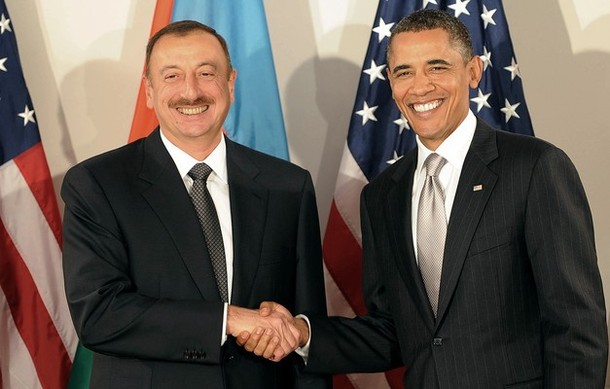
Despite the smiles, hearty handshakes and declarations of partnership, President Obama’s meeting with Azerbaijani President Ilham Aliyev in New York last month was actually a symptom of waning U.S. influence in Eurasia. And neither that encounter nor the recent visits to Baku by the secretaries of state and defense will accomplish much of anything in terms of advancing long-term U.S. interests until the administration comes up with a strategy for engaging the countries of the region.
The extraordinary high-level attention paid to Azerbaijan is a result of that country’s recent temper-tantrum approach to foreign policy. Due to a variety of snubs both imagined and real (in particular the decision not to engage Baku as the United States pursued normalization of relations between Azerbaijan’s archrival Armenia and its ally Turkey), Aliyev felt his country was being overlooked by the Obama administration. So he decided that the best way to get U.S. attention was to lash out, specifically by putting the screws on the Turks to scupper the Armenia rapprochement, cozying up to Moscow on energy deals and threatening to pull the plug on the overflight agreement that allows the U.S. military a crucial corridor to Afghanistan.
Of course this was not the most constructive way of getting Washington’s attention, but Aliyev did have a point. Even if there was a U.S. ambassador in Baku—and for almost two years, there has not been one—it remains unclear what policies he or she would implement besides ensuring safe passage for men and matériel into Afghanistan and preventing a “turn to the North” in Azerbaijani foreign policy. The absence of substantive U.S. engagement put Aliyev in the driver’s seat, allowing him to essentially force President Obama to meet with him instead of any other of the dozens of heads of state in New York.
How did we get to this sorry state of affairs, when an autocrat from a tiny country can strong-arm the president of the United States into a photo op? Despite the administration’s critics’ cries to the contrary, the answer is not some sort of trade-off of the former Soviet region to achieve the administration’s “Russia reset.” Far from sacrificing them, U.S. policy toward the countries of Eurasia, from Moldova to Kyrgyzstan, has just not been coherently formulated.
This has to do with an unintentional, but nonetheless strategic, neglect of Eurasia across U.S. administrations. Historically, Washington has seen these countries through a Russian lens, treating them either as brides to be courted away from a rival suitor (i.e., Moscow) or as pawns on a geopolitical grand chessboard. As a result, U.S. engagement was at best lopsided, and more often than not simply notable for its absence.
The improved climate with Russia actually presents an ideal opportunity to address this problem and develop a strategy for Eurasia not shaped by geopolitical competition. But strengthening weak relationships in the region requires a reimagining of Eurasia. And that should begin by seeing the region not as Russia’s backyard, China’s playground, or the whistle-stop for supplies on their way to Afghanistan, but rather as a diverse group of countries worthy of taylor-made approaches.
A more effective U.S.-engagement strategy for Eurasia should be based on three principles. First, U.S. policy toward these countries should be predicated on their respective merits, not their value as bargaining chips or their relationships with other countries. Policy makers and analysts should start with the basic question of what American interests are at stake in a given bilateral relationship. That should also mean paying little attention to leaders’ pronouncements of geopolitical loyalty. Did the American interests at stake in Ukraine change when its president declared a strategic partnership with Moscow a priority? Hardly.
Second, the United States should broaden engagement with the states of the region, using all of the tools in the toolbox, not just in terms of security and natural resources, but diplomatically, economically and culturally. Broad-based engagement would prevent episodes like Aliyev’s outburst, and allow us to more effectively pursue our interests.
Finally, U.S. policy should emphasize transparency and win-win opportunities, while simultaneously rejecting Russian notions of “spheres of influence” and antiquated zero-sum arguments from the Eurasian governments themselves.
Such a strategy is more than a creative balancing of Russia or a simple jettisoning of "Great Game" analogies. It requires playing a new game, which positions the United States as a potential full partner of Eurasian states, without reference to our or their relations with Russia.
The next time President Obama meets a counterpart from the region, it should be at his initiative, and he should come to the table with a substantive U.S. agenda. If our message remains, “don’t worry, we still care about you," we won’t be calling the shots.
Samuel Charap is a Fellow in the National Security and International Policy Program at the Center for American Progress. Alexandros Peterson is Senior Fellow with the Patriciu Eurasia Center at the Atlantic Council. This article was published on The National Interest. Photo credit: Getty Images.
Image: 610x_39.jpg
